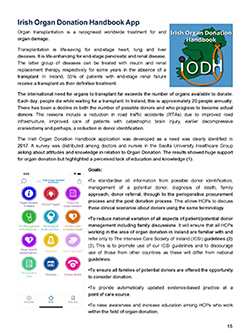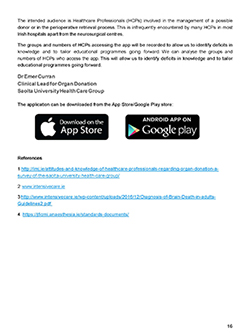Background
For most patients with end stage organ failure, the only acceptable long term treatment is organ transplantation. Invariably the demand for organ transplantation consistently exceeds supply. Last year in Ireland, 234 life-saving transplants were undertaken. However, on average between 30 and 40 patients die every year while waiting on an organ transplant.
The national team of Donor Coordinators from Organ Donation Transplant Ireland (ODTI) manage the overall process of donation and retrieval in Ireland and work closely to support families at the time of their loss and throughout the journey of donation. In addition, there are specialist organ donation personnel in each hospital group throughout the country. They provide advice, staff training and education on donation.
Organ donation and transplant surgery are well established in Ireland. There are three specialist transplant centres in Ireland, as follows;
- The National Kidney Transplant Service is located in Beaumont University Hospital where both living and deceased kidney transplants occur
- Paediatric kidney transplants are performed in Temple Street Children’s University Hospital
- The Mater Misericordiae University Hospital hosts the National Heart and Lung Transplant Service.
- The National Liver Transplant Servicehas been running at St. Vincent’s University Hospital since 1993. More recently, in 2016 the National Pancreas Transplant Centre moved to St. Vincent’s University Hospital
In 2015 the Royal College of Emergency Medicine revised published guidelines on the role of emergency medicine physicians in end of life care. Making the right decision regarding the withdrawal of life sustaining treatment in all critically ill or injured ventilated patients in the ED can be difficult.
Discussions around potential organ donation do not usually commence until the first set of brain stem tests confirm brain death. These tests are normally conducted in the ICU.. In many cases, patient prognostication should be deferred in the ED.
If a patients next-of-kin raise the issue of organ donation in the ED, Senior EM/ICU Clinical Leadership and Organ Donation Nurse Manager involvement should be sought.
Process
The following information outlines the organ donation process, facilitated by the Organ Donation Nurse Manager (ODNM) and Donor Coordinators in Organ Donation and Transplant Ireland (ODTI).
What organs can be donated (more here)?
Organs that can be donated in Ireland are:
- Heart
- Lungs
- Liver
- Pancreas
- Kidneys
Who can be considered a potential organ donor?
A potential donor has to be in a hospital and maintained on a ventilator before they can become an organ donor. A patient’s organs can be donated after:
- Brain stem death, or;
- Cardiac death
What is brain stem death? (more on brain stem death here)
Brain stem death means that there is no vital brain function. The patient cannot breathe without the help of the ventilator. Two sets of brain stem tests are carried out. The time of death recorded on the death certificate is when the second set of brain stem tests have been completed. It is only following brain stem testing that the patient’s next of kin should be consulted about the prospect of organ donation.
Criteria for brain stem death
The three essential findings in brain death are;
- coma
- absence of brainstem reflexes
- apnoea
An evaluation for brain death should be considered in patients who have suffered a massive, irreversible brain injury of identifiable cause. A patient determined to be brain dead is legally and clinically dead.
Donations after Brain stem Death (DBD)
Organ donation can be considered when a patient, on a ventilator, is diagnosed brain stem dead. This could be as a result of a massive brain haemorrhage, brain hypoxia (e.g. post cardiac arrest, drowning etc.), or some form of head trauma. Brain stem death is the permanent loss of function of the brain stem and this is ascertained through tests carried out by two senior doctors to determine absence of brain function. When these tests show that there is no brain function and no chance of recovery, the patient is declared dead.
Donation after Circulatory Death (DCD)(more on DCD here)
Donation after circulatory death (DCD) occurs when a patient donates organs following the determination of death by cardio-respiratory criteria. A strict protocol is followed before this is considered. The organ donation nurse manager or the donor coordinators can provide more information.
Management of the Potential Organ Donor
The Intensive Care Society of Ireland have published comprehensive guidelines on the optimal clinical Management of Potential Organ Donors. The guidelines as outlined should be implemented only after the diagnosis of brain death in patients who are potential organ donors. Before the diagnosis of brain death, patients should be managed as appropriate for their underlying condition. After the diagnosis of brain death, should the patient have wished to become an organ donor, treatment becomes oriented toward optimising organs that may be retrieved for transplantation rather than toward neuroprotection.
Identifying patients who are potential donors
Organ donation should be considered as a usual part of 'end-of-life care' planning. Identify all patients who are potentially suitable donors as early as possible, through a systematic approach. While recognising that clinical situations vary, identification should be based on either of the following criteria:
- Defined clinical trigger factors in patients who have had a catastrophic brain injury, namely:
- the absence of one or more cranial nerve reflexes and,
- GCS ≤4 that is not explained by sedation unless there is a clear reason why the above clinical triggers are not met (for example because of sedation) and/or a decision has been made to perform brainstem death tests, whichever is the earlier
- The intention to withdraw life-sustaining treatment in patients with a life-threatening or life-limiting condition which will, or is expected to, result in circulatory death
Role of the Organ Donation Nurse Manager (ODNM)
We understand that families are less likely to be willing to positively consider organ donation if they have not understood and accepted their impending loss. The presence of a ODNM in these conversations dramatically increases the consent and authorisation rate. The ODNM has the bereavement skills and time to help you deliver empathic, family first, end of life care. Therefore, donation conversations need to be planned. And the option of donation should ideally be raised in the presence of a ODNM and after confirming the families understanding and acceptance of loss.
- One way is that the doctor raises the option of organ donation as an end-of-life choice the family can make on the patient’s behalf and hands over the conversation to the ODNM
- Alternatively, in the planning conversation, it may have been decided that the SNOD be the person to raise donation
How to make a donor referral
Contacts:
- Breda Doyle, Organ Donation Nurse Manager, South/South-West Hospital Group
- Dr Adrian Murphy, Clinical Lead for Organ Donation, South/South-West Hospital Group
Breda Doyle and Dr Adrian Murphy are contactable via switch board, Cork University Hosptial.
Useful resources
- Irish Organ Donation application (Available via Apple store / Google)
- Intensive Care Society of Ireland
- Organ Donation & Transplant Ireland
- NHS Blood and Transfusion (NHSBT)

